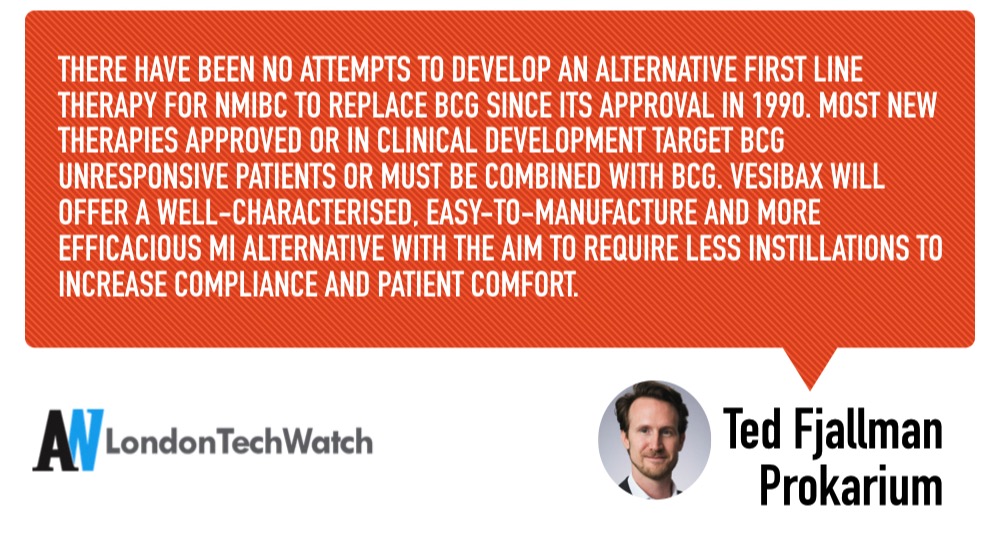Around 70-80% of newly diagnosed bladder cancer patients have a form of early-stage non-muscle invasive bladder cancer (NMIBC), yet there has been a lack of innovation in first-line therapy for NMIBC for more than 20 years. Prokarium is the biopharmaceutical company that’s developing microbial cancer immunotherapies such as Vesibax to treat and prevent bladder cancer. Prokarium plans to bring its immunotherapy solutions to clinics by 2022. In addition to developing cancer immunotherapies, Prokarium is also focused on developing vaccines against infectious diseases. It’s currently working on a vaccine, Entervax, to combat the fever caused by Salmonella serovars typhi and paratyphi A.
London TechWatch caught up with CEO Ted Fjallman to learn more about Prokarium’s upcoming pipeline of novel therapies, its current focus, and recent funding round, which brings the total funding raised to$47.6M.
Who were your investors and how much did you raise?
First close of the $21M Series B was led by Korea Investment Partners (KIP) followed by Flerie Invest, Riyadh Valley Company (RVC) and the UK Government’s Future Fund.
Tell us about the product or service Prokarium offers.
Prokarium is developing both microbial cancer immunotherapies and vaccines against infectious disease:
- Vesibax: microbial immunotherapy for the treatment and prevention of bladder cancer
- Entervax: vaccine against enteric fever caused by Salmonella serovars typhi and paratyphi A
- Onconella platform: proprietary microbial strains in preclinical development for the treatment of solid tumours
 What inspired the start of Prokarium?
What inspired the start of Prokarium?
Leveraging bacteria’s innate ability to activate the immune system in a broad way, while also being modifiable to produce specific responses, was an attractive attribute of the technology Prokarium acquired from a US company.
How is Prokarium different?
“Prokarium’s bacterial strains have the potential to be potent activators of multiple innate immune pathways, harnessing intrinsic microbial properties combined with modulatory effects from cutting-edge engineering to initiate and drive a patient’s anti-tumor responses.” – Hyam Levitsky, MD
What market is Prokarium targeting and how big is it?
Prokarium is developing Vesibax, an innovative, safe, and effective microbial immunotherapy (MI) for early-stage bladder cancer, a disease with over 550,000 new global cases every year. Early-stage non-muscle invasive bladder cancer (NMIBC) is typically treated with the tuberculosis vaccine Bacillus Calmette-Guérin (BCG). Despite shortcomings associated with the use of BCG as an NMIBC therapy (antiquated manufacturing and global supply shortage, high disease recurrence, long treatment schedule, and low compliance, considerable local/systemic side effects) and increasing cases due to aging populations, there have been no attempts to develop an alternative first-line therapy for NMIBC to replace BCG since its approval in 1990. Most new therapies approved or in clinical development target BCG unresponsive patients or must be combined with BCG. Vesibax will offer a well-characterised, easy-to-manufacture, and more efficacious MI alternative with the aim to require fewer instillations to increase compliance and patient comfort. The use of Vesibax in NMIBC is supported by promising preclinical research showing improved immune response, tolerability, tumour regression, and survival in animal models compared with BCG.
What’s the business model?
Develop novel therapeutics and vaccines in the area of unmet medical needs to clinical Proof of Concept.
How has COVID-19 impacted the business?
During the pandemic, the interest in biotech has gained a lot of attraction for its ability to be part of the solution
What was the funding process like?
Diligent work from the team and dedicated investors made the process go well.
What are the biggest challenges that you faced while raising capital?
Because Prokarium is at the forefront of discovering new microbial immunotherapies, we sometimes have to explain our technology and engineering capabilities in more detail than say a small molecule or antibody company.
What factors about your business led your investors to write the check?
Data, data, data, and that we have a highly experienced team to develop and execute our plans.
Data, data, data, and that we have a highly experienced team to develop and execute our plans.
What are the milestones you plan to achieve in the next six months?
Readout from phase 1 clinical trial (Entervax), preclinical package for Vesibax (bladder cancer).
What advice can you offer companies in London that do not have a fresh injection of capital in the bank?
Focus on generating key data/proof of concept and target investors specifically interested in your field. Also, bring together a solid team that has both the expertise and network in the field to deliver on your company’s goals.
Where do you see the company going now over the near term?
Developing the in-house clinical and regulatory capabilities to prepare for running multiple clinical trials in parallel.
What is your favorite restaurant in London?
Senor Ceviche – but it closed down (does it say something about my taste?)
You are seconds away from signing up for the hottest list in London Tech! Join the millions and keep up with the stories shaping entrepreneurship. Sign up today





